
Yes, that’s right; it’s time to take a break from reviewing generation VII Pokémon and take a look at THE CINEMATIC EVENT OF THE DECADE, the movie so many of us have spent basically our entire lives waiting for: Legendary Pictures’ Pokémon: Detective Pikachu (hereafter just Detective Pikachu because… come on, Pokémon Company International; just get the fµ¢£ over yourselves). Clearly it is my responsibility, as a mad person writing about Pokémon on the internet, to discuss whether I think Detective Pikachu is a successful movie.
…I mean, [spoiler alert], the answer’s yes, but we’re going to talk about why.
I’m interested in this film on two levels. First, this is arguably the first Pokémon movie that is meant to have mass appeal outside of just fans of the Pokémon games. A lot of Pokémon movies are, let’s face it, vehicles for featuring legendary Pokémon that play prominent roles in recent or upcoming games, and their writing is… well, let’s call it hit-and-miss. Guys… I love the Lugia movie as much as anyone, but Casablanca it is not. Frankly, I think you can make a plausible, albeit facetious, argument that up until now the best Pokémon movie was actually Fantastic Beasts and Where to Find Them. Now, Detective Pikachu isn’t Casablanca either, but it is at least a decent movie in its own right (which is a high bar for movies based on video games!). The second thing I’m interested in is that, aside from just being live action, Detective Pikachu is the first Pokémon movie that is creatively independent from the Pokémon anime (and doesn’t feature Ash Ketchum), which makes it a fundamentally new type of addition to the franchise that has its own take on Pokémon’s core themes. So, tomorrow I’m going to talk about why Detective Pikachu is specifically a good Pokémon movie, and today I’m going to talk about why it’s a decent movie generally: in short, it’s well-cast and acted, with (I will argue) a coherent theme that ties in with the main character’s arc and its central conflict, and was, at the very least, not a commercial flop. And, y’know, some significant flaws, which I also am going to talk about because they will eat at me if I don’t.
I was going to start this whole thing with a synopsis, but frankly I tried to write one and it was just too long, and there will be other summaries on the internet that you can read first if you don’t want to see the movie but are still interested in what I have to say, so I’m just going to get straight to analysis. Please bear in mind that although I took some notes during the movie, quotations are from memory and may not be verbatim, and of course, it should go without saying: HERE BE SPOILERS!

Of course, if we’re going to talk about “success” we need to think about the crass commercial side of what that means: did Detective Pikachu make a lot of money at the box office? And the answer to that is… suuuuuure? Detective Pikachu’s promised and actual box office figures have to be viewed in the light of a wider conversation about video game movies and whether there is a “glass ceiling” that limits those movies’ profitability and critical acclaim. Video game movies are unavoidably kinda nerdy, which limits their mass-market appeal – if a movie’s selling point is “you know that game you love? This is also that,” then someone who doesn’t love that game isn’t going to be enticed, and even the best video games still just don’t have the same cultural cachet as the best books. The deeper problem is that games are good in different ways and for different reasons than movies and books. Games are compelling because they present us with compelling choices; Pokémon, for example, is compelling not just because it gives us 800 different fantastic creatures, but because it goes on to ask us “now, which ones do you want?” If a game is good, then some of what makes it good will be lost in the process of adapting it to a non-interactive narrative medium – always, inescapably, inevitably. Now, as it happens, Detective Pikachu the 2016 video game is not a particularly good game. I’m playing it now and enjoying its take on the Pokémon world, but it has been criticised (I think fairly) for, among other things, overly simplistic mechanics and limited scope for player choice. The things it does well translate effectively to film; the things it does poorly don’t matter in film. On the other hand, Pokémon itself, and Pikachu in particular, have reached a degree of penetration into mainstream culture that is fairly unusual for even the best video games, thanks in part to the recent and ongoing success of Pokémon Go. Pokémon therefore has a good shot at parleying its universal pop culture recognition into something that people will actually want to see. If there were ever a time to break that “video game glass ceiling,” this was it.
And… well, eh.
Detective Pikachu had the best US box office opening weekend of any video game adaptation ever, beating previous luminaries like Assassin’s Creed, Lara Croft: Tomb Raider, Rampage, and indeed the first Pokémon movie, Mewtwo Strikes Back. At time of writing, it has just exceeded the lifetime earnings of Prince of Persia: The Sands of Time and Angry Birds to take third place, and may yet seize the crown of the current record-holder, Warcraft (another Legendary production). It’s also broken the pattern that video game movies tend to significantly underperform in the US, earning only 25% or so of their box office take there, but are saved by good sales in China – Detective Pikachu had a much more typical breakdown, with 33% of its profits coming from the US market, about what you’d expect from a typical 2010s Hollywood blockbuster. In the wider scope of non-video game movies, it’s doing… fine? It’s not a smash hit, or the magic bullet that its producers hoped it might be, but it’s also not a flop by any means. There is an argument that it’s underperforming a bit because it was overshadowed by Avengers: Endgame, which outgrossed Detective Pikachu on the latter’s opening weekend, even though Endgame had been out for two weeks already. Endgame legitimately is an outlier. This is a movie that you actually could call, in all caps, “THE CINEMATIC EVENT OF THE DECADE,” and it would take me a minute to figure out whether you were joking; it’s within what feels like spitting distance of Avatar’s record for the highest-grossing movie of all time. The comparison is deeply unflattering, and kind of unfair. It is also true, though, that Detective Pikachu is not by any means a masterpiece – and in any case, there’s only so much we can make of box office figures, so let’s get to the movie itself.
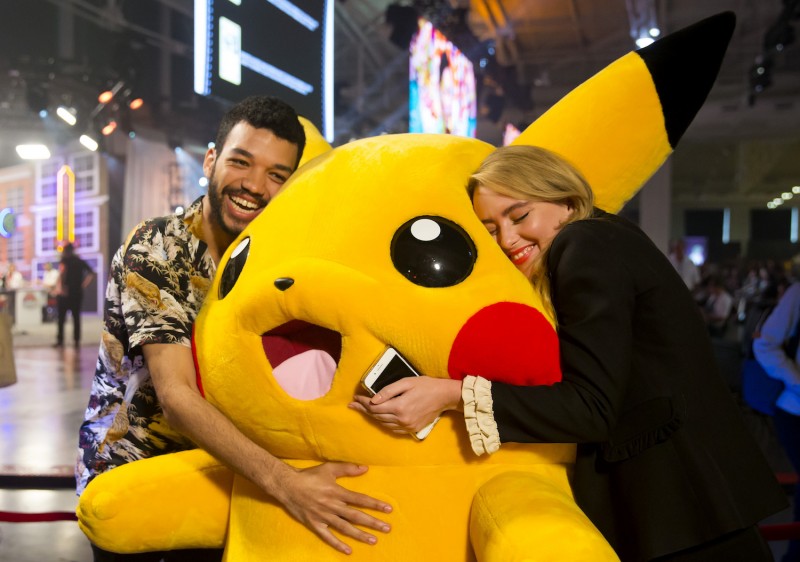
I’m not really a film critic, and analysis of acting is not my lane, exactly, but it’s clear even to me that this movie has some great performances. Justice Smith, as awkwardly adorable protagonist Tim Goodman, and Ryan Reynolds, as the voice of Pikachu, have great chemistry that makes their characters’ relationship a solid emotional foundation for the story. Pikachu’s constant wisecracking (much of it ad-libbed by Reynolds) has been controversial with reviewers, but in my opinion is almost a reason to see the movie on its own. Justice Smith and Kathryn Newton, who plays plucky media intern Lucy Stevens, are both Pokémon generation kids like me (…okay they’re younger than me; shut up) and seem genuinely excited to be part of this phenomenon we grew up with. Bill Nighy is particularly fantastic as the film’s villain, Howard Clifford. Nighy can do “wise, kindly old man,” which is what Clifford’s early scenes call for, but has always clearly relished really over-the-top and campy roles too, and seems to have a lot of fun doing the voice-acting and motion-capture for the mind-controlled Mewtwo during the film’s climax. The movie’s character arcs and plot twists are not exactly ground-breaking cinema: Tim and Pikachu have a fairly uncomplicated buddy cop dynamic, and the detective storyline has some nice twists but nothing that would really stun an attentive viewer. However, the story is competently told, with moments of genuine emotion, and minor details set up early generally lead to satisfying payoffs later on (in particular, I actually made a note of Howard’s Ditto in human form pushing his wheelchair in an early scene because I thought it was interesting, but was still blindsided when that Ditto later turned out to be a significant player in the plot). A fairly conventional, some might say cliché, reconciliation-of-father-and-son ending could easily have been sappy and hollow, but I cared enough about the characters by that point to find it satisfying. The CGI Pokémon really work (and I feel it’s important to emphasise how much of a bullet Detective Pikachu dodged here, in light of the recent furore over the Sonic the Hedgehog trailer), and there’s enough variety in them, albeit mostly in the background, to really make this feel like the diverse world we know and love. There are also some great little nods and winks to the long-time fans, like Pikachu’s ugly-crying rendition of the anime’s original theme song, Tim’s binder full of Pokémon trading cards in Harry’s apartment, or a cameo by a Jigglypuff with the exact microphone that the Jigglypuff from the anime uses. It’s not really trying to be a challenging or artistic movie, just a fun one – and it is.
Now, let’s talk theme – starting with the role and characterisation of the film’s villain.
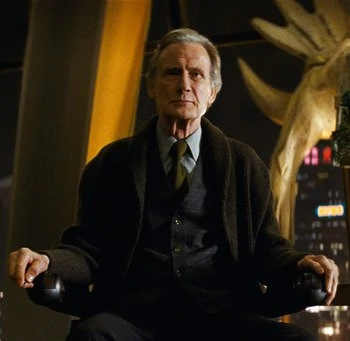
Howard Clifford is introduced in a Ryme City tourism infomercial as a billionaire philanthropist, and the founder of this remarkable new community. He is, we are told, a visionary – an inventor-CEO with a brilliant mind and a dream of a world where humans and Pokémon live in perfect harmony, closer than they’ve ever been before (which ideologically lines up pretty well with the desires of major role model characters throughout the Pokémon franchise). And that’s all true… from a certain point of view; it just turns out he also means “closer” than anyone else has in mind. Howard doesn’t appear in the game that the film is based on; in the game, the villain is Roger Clifford (played in the movie by Chris Geere), Howard’s son and the owner of Ryme City’s major news network. He wants to use the same mysterious R-gas we see in the movie to cause Pokémon to riot all around the city, creating a high-profile disaster for his network to cover. I mention this because it’s pretty much exactly the story that Howard feeds to Tim in the movie when they first meet, when he’s trying to manipulate Tim and Pikachu into tracking down Mewtwo for him. The plot change from game to film makes the story a little more complex, sure, but more importantly, it helps the film’s thematic unity – because Howard and Roger Clifford are father and son, and ultimately this film is about Tim’s relationship with his father, explored both through flashbacks and through the revelation that Pikachu was Harry all along.
I’m not going to pretend that the relationship between the Cliffords is super well-developed, because they have, if memory serves, exactly one scene together, and it’s near the beginning of the movie, when Tim visits Lucy’s workplace and happens to see them filming a broadcast together. However, that scene in retrospect is actually quite important. Roger comes across as a workaholic jerk who resents the near-messianic status his father has as the founder of Ryme City, while Howard seems like a lonely old man trying to reconnect with his son. Obviously, by portraying Roger in a negative light, this scene is supposed to give us a reason to believe Howard when he tells Tim that Roger is the one behind the conspiracy, but it also adds significance to Roger’s line as Howard is arrested at the end of the movie: “I blame myself for not being there for him.” Howard, for his part, claims during the scene in his office that Roger resents Pokémon because Howard has devoted his whole life to them and, as a result, could never be a good father. And yeah, Howard is lying to Tim in this scene, but that part rings true to me, because Roger, although he has a Noivern in the game, doesn’t seem to have a Pokémon partner in the movie (and Tim’s lack of a partner is unusual enough for multiple characters to comment on it). If that description of the breakdown of the Cliffords’ relationship sounds familiar, it’s because that’s exactly why Tim resents Pokémon at the beginning of the movie.
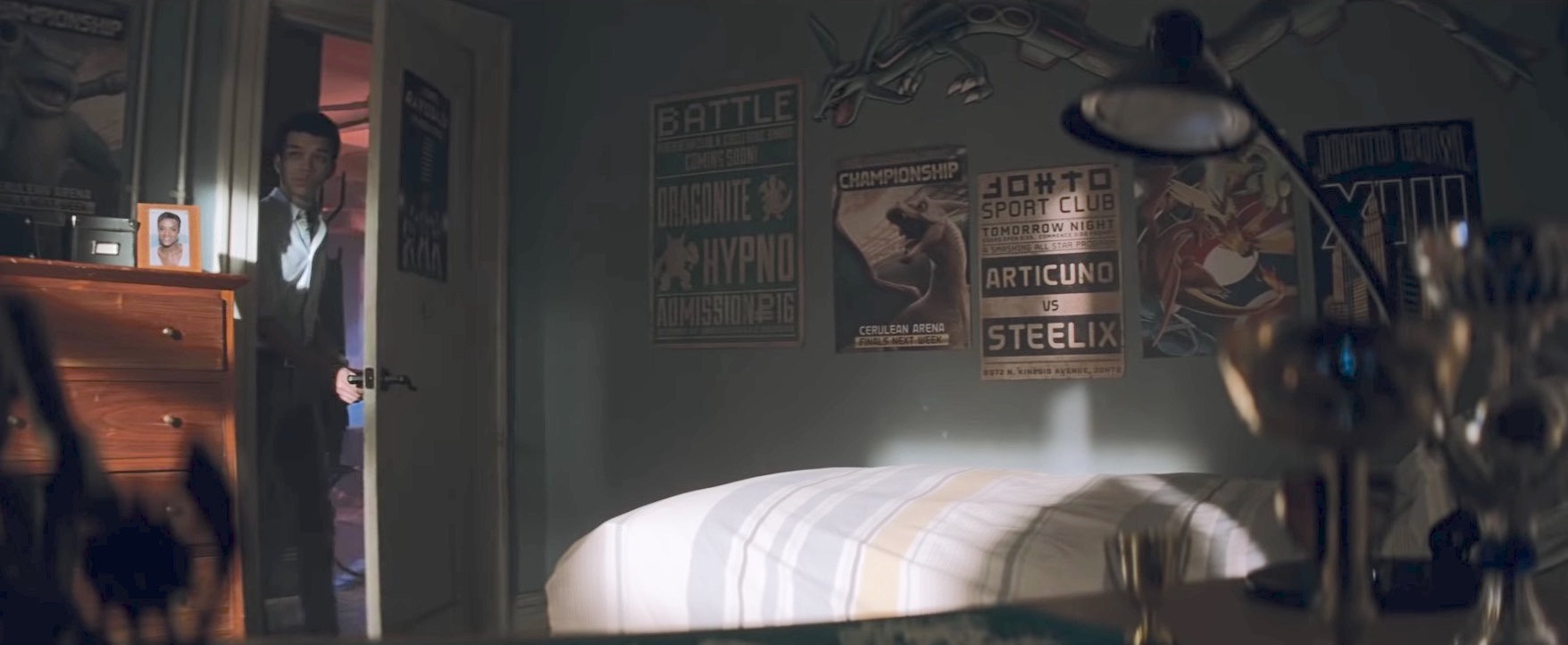
We learn from flashbacks, and from Tim’s conversations about his father with Pikachu, that Harry Goodman threw himself into his work in Ryme City after the death of his wife, Tim’s mother. Tim felt that Harry had abandoned him, and cared more about his work – and about Pokémon – than about his son. This coincided with Tim giving up his childhood ambitions of becoming a Pokémon trainer. I don’t remember whether Tim explicitly says to Pikachu the words “Pokémon took my dad away from me,” but… he pretty heavily implies it (and honestly this isn’t even unusual; it’s kind of a theme in the Pokémon franchise). However, when Tim first visits Harry’s apartment, he finds a birthday card addressed to him containing a train ticket to Ryme City and a handwritten apology, and realises that Harry had been hoping to reconcile with him before his supposed death. Also, Tim already knew about the room that Harry kept for him in the apartment with all his childhood Pokémon merch, but I think seeing it makes it more real for him. At one point he discusses with Pikachu his realisation that Harry wanted to make things right, and for the rest of the movie, he has a question on his mind: “what if one of us had reached out sooner?” Howard is aware that he’s failed as a father, but when he tries to make amends, Roger snubs him – and Howard doesn’t keep trying, instead making his son another victim of his conspiracy. The Cliffords have the chance to repair their relationship, but don’t take it. The end of the movie gives Tim and Harry another chance at theirs, and this time, they do.
All of this goes into what I think is supposed to be a central theme of the movie: communication. Detective Pikachu is a story about a boy and a Pokémon with an unlikely ability to communicate, which ultimately allows the boy to rekindle a lapsed relationship with the father he hasn’t spoken to in years. The fact that Tim and Pikachu can talk to each other, when no other humans and Pokémon usually can, is really powerful as a symbol for Tim’s relationship with Harry, but also in a practical sense weirdly underexploited, in my opinion. This was the one thing that really intrigued me about the premise of the game, when it was announced. It seemed like not just an interesting new avenue for exploring the world of Pokémon (because the ability or inability of Pokémon to talk or to understand human speech is one of the weird question marks that has hung over this universe since its inception), but also a really cool element for a detective story in particular. Tim and Pikachu together can access witnesses who are beyond the reach of normal detectives because of the communication barrier that exists between humans and Pokémon. Pikachu says this to Tim explicitly in the movie. They don’t… do very much of that, though. The one scene where Tim and Pikachu talk at length to a Pokémon witness is the scene with the Mr. Mime, and communication is definitely a theme there, but Tim actually turns out to “speak Mr. Mime’s language” better than Pikachu does. They don’t try to speak to any of the “fight club” Pokémon, or negotiate with the Greninja that attack them in PCL.
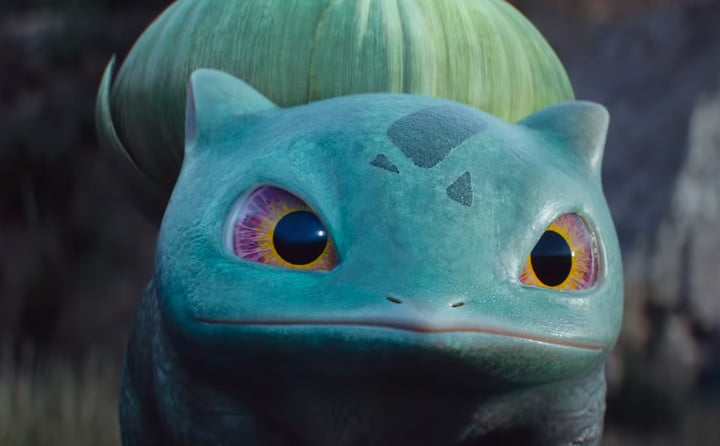
What I do love, though, is Pikachu’s line when he tries to explain to Tim what communicating with Pokémon is actually about: “You don’t need to talk for us to understand you; we can feel what you’re saying.” That line might not have seemed significant at the time to people who aren’t crazed nerds like me (it’s something that Pokémon media have been thinking for over 20 years but rarely say outright). The movie clearly cares about it, though, because it becomes a critical piece of information for Tim later: after the escape from PCL, when Tim pleads with a wild Bulbasaur to find help for Pikachu. Lucy tells him “it can’t understand you,” but Tim remembers his partner’s words and knows better: the Bulbasaur doesn’t know what he’s saying, exactly, but it can feel the intention, and that saves Pikachu’s life. And that’s… kind of the main thing Tim learns in this story, the main way that he grows as a character, allowing him to overcome problems (both plot-related and personal) that he wouldn’t have been able to at the beginning of the movie: he learns, as cheesy a moral as it is, to “speak from the heart.” You don’t need to know exactly what to say or how to say it – what’s important is that you reach out, express your feelings, and don’t allow yourself to become isolated. It’s how you communicate with Pokémon, but the message is that it also works with people. That’s the test that Tim faces in the final scene: reaching out to someone who, he once thought, wouldn’t understand him.
To me, this is why the movie has a decent, if somewhat unimaginative, core that makes it impossible to dismiss as nothing but a shameless video game tie-in (which… let’s be honest, is what a lot of Pokémon movies are). Now I want to talk for a bit about two nagging problems I have with the movie, and then we can all go.
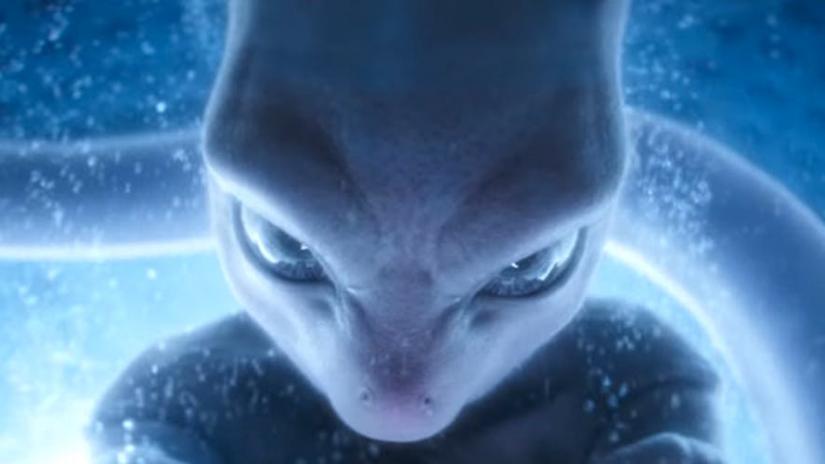
The actual mechanism of the villain’s plan – Mewtwo’s ability to merge human souls into the bodies of Pokémon – comes a little bit out of nowhere. It’s not something I have trouble justifying in retrospect, with all the powers of a ridiculously analytical Pokémon nerd at my disposal: I can believe that this is something a ludicrously powerful Psychic Pokémon might be able to do, and for most of the movie it seems like Mewtwo is responsible for Pikachu’s amnesia, so mental manipulation is something we understand to be one of its abilities. A description of the purpose of the R-gas as causing “confusion and a total loss of free will” during the PCL scenes stuck out to me as weird phrasing at the time since “loss of free will” doesn’t seem like a good description of the rabid state that the gas causes, but in retrospect it’s clear that this is meant to anticipate the use of the gas to render a Pokémon’s mind vulnerable in preparation for the psychic transference. We also learn at the same time that the gas was created using Mewtwo’s cells, so the idea that it has some special additional effect in combination with Mewtwo’s powers isn’t ridiculous. Still, something as plot-crucial as this needs to be set up a bit more – and that would still be true, just to be clear, even if it were an established power of Mewtwo’s in other Pokémon media; the film still needs to “show its work.” Howard turning out to have a piece of technology that lets him control Mewtwo’s body, by contrast, doesn’t feel like as much of a leap, since Lucy has explained that the scientists at PCL were rumoured to be working on ways to control the minds of Pokémon. It also just seems “fairer,” because we can tell just by watching the scene that the matching headsets are the key, leaving an obvious vulnerability in the plan for the heroes to exploit, whereas whatever Mewtwo does might as well be magic. Frankly I don’t think the movie ever explained why the human bodies vanish when their owners’ minds are transferred; we need that for the plot, because Harry’s body needs to disappear when he is fused with Pikachu, but what happens to them, and how does Mewtwo make them all come back? I’m willing to let all this slide because I like the thematic resonance of what Howard is trying to do (which is going to be a major point of the second half of this review), but… it’s one of the movie’s sloppier plays.
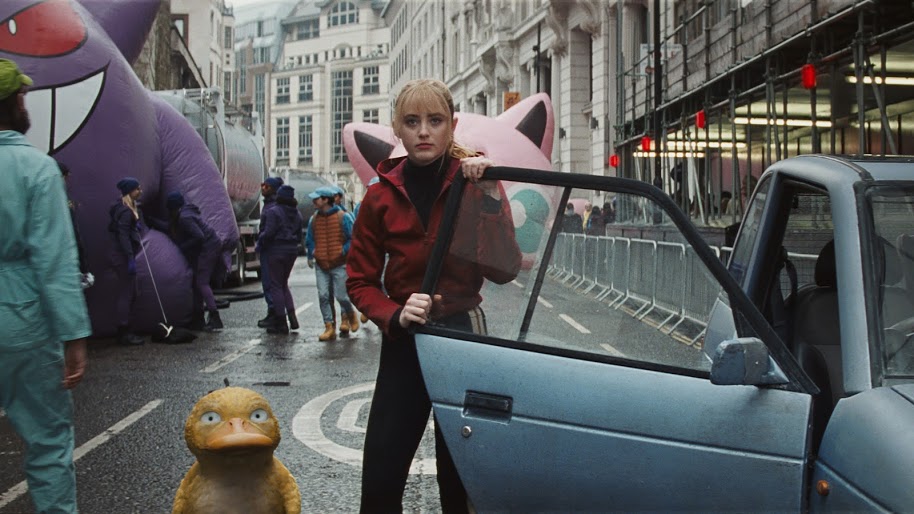
Another thing that I’m not wild about is Lucy’s role in the climax, because… she doesn’t really get one? There are scenes when she and Tim return to Ryme City from PCL that set up a thread where Lucy is trying to get word out to the public. None of the news anchors will listen to her because she’s just an intern, and even when she gets her hands on a press pass there’s no time for her to speak to the mayor of Ryme City. And it seems like this is leading up to Lucy getting herself on camera by any means necessary so she can warn the city that treachery is afoot and somehow mitigate the disaster, proving her journalistic skills to her superiors in the process. This… doesn’t really happen; she does briefly manage to seize some screen-time, but her efforts don’t seem to help resolve the crisis or protect any civilians, and she winds up at the mercy of Howard’s plot along with the rest of Ryme City. To me that sort of falls into a fairly recognisable pattern of movies writing Strong Female CharactersTM and just forgetting to do anything interesting or satisfying with them. Lucy’s part in the events of the film is acknowledged at the very end, when Roger Clifford realises that she has potential and promotes her on the spot, so it’s not like she doesn’t get what she wanted; she ends the film in exactly the position she was aiming for. It’s just that most of the journalistic work she does to get there happens offscreen, some of it before the film even begins, so her role in the plot is mostly reduced to providing exposition. Now, the emotional core of the movie was always supposed to be the buddy cop relationship between Tim and Pikachu, so I don’t know that this is a damning flaw. Still, Lucy is notionally one of four-ish major characters, but she doesn’t really get anything I’d call a character arc (just a linear goal), and her role in the climax is one of the few places where Detective Pikachu gives us a setup without a satisfying payoff. Frankly I think she deserved more, so this is one of the things that hold it back from actually being an excellent movie in my eyes.
That’s what I think of Detective Pikachu as a movie – flawed, sure, but with heart, and a strong sense of what it wants to be about and what kind of story it wants to tell. Next time we’re going to talk about Detective Pikachu specifically as an addition to the Pokémon franchise – see you then!

Wow. Very detailed analysis. Really liking this.
Will you have any comments on the design of the individual species of Pokémon in the movie?
LikeLiked by 1 person
I don’t think so; I’ve more or less said everything I want to say here https://pokemaniacal.com/2019/04/12/detective-pikachu-things/. Short answer: I like the CG Pokémon, and I think they’re a good foundation for doing more in the future.
LikeLiked by 1 person
“So, tomorrow I’m going to talk about Detective Pikachu is specifically a good Pokémon movie”
I think you forgot a word in there.
“in light of the recent furore”
Furor*
With those out of the way, I do wish that Lucy would have gotten a larger role in the plot, she was a fairly interesting character and it would have been cool if the movie had been able to showcase that..
LikeLike
Will fix the typo. I am reasonably certain, though (I actually checked this at the time), that “furor” is the Latin spelling, and in English it’s “furore.”
EDIT: Have checked again, and apparently in American English it is “furor,” but I’m from New Zealand and we almost always use British English spelling (see also: https://pokemaniacal.com/2019/05/03/ty-asks-6/), so I’m leaving it.
But yeah – I’ve been trying to think about what would be the best way to expand her role, and a few extra scenes in the climax along the lines of what I talk about here, showing some kind of impact from her actions and attempts to broadcast the story, would have improved it a lot without taking much time. I would have liked to built more for her to do into the movie’s first act as well, but I’m not sure of the best way to do that.
LikeLike